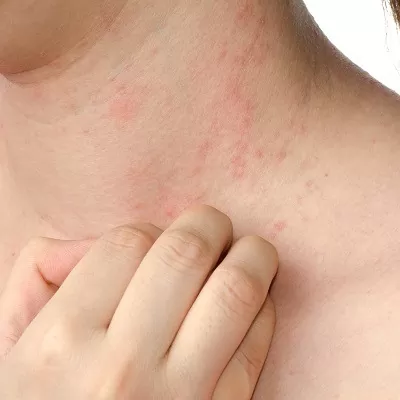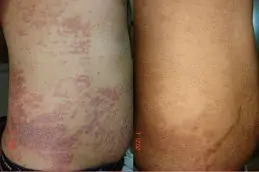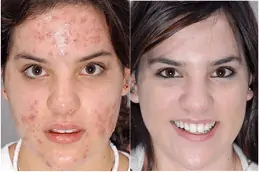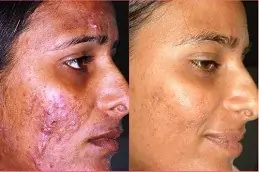Causes:
There are many reasons skin diseases occur. The factors affecting skin can be both internal and external.
Each layer of the skin is prone to specific diseases. Some painful conditions, such as burns, can affect all layers of the skin at once; others may affect just one layer.
Skin pathologies can be divided into infectious and non-infectious, but this division is not always true. For example, dermatitis is caused by a fungus that lives on every person’s skin but only manifests when immunity is compromised.
Chronic skin diseases are of particular importance in dermatology. Unlike acute infectious processes, they accompany a person for long periods of life and require consistent treatment. They often develop under the influence of various external and internal factors ranging from parasitic invasion to stress.
Certain skin conditions can be inherited. Many people note that problems like juvenile acne are similar in children and their parents.
Results:
The treatments vary from person to person, and it depends on the type of problem being treated and the techniques used. The results start showing after the first treatment session and are permanent.
Symptoms:
It is easy to suspect a skin disease in yourself or a child. Usually, the skin has a uniform color, moderate moisture, and a smooth surface. A noticeable change in any of these criteria or the appearance of unpleasant sensations, itching, and pain is a cause of concern.
Before visiting the doctor, it is crucial to find out how dangerous this condition is and protect yourself and your loved ones.
Non-infectious dermatitis, such as psoriasis or eczema, is not contagious. Still, it can significantly worsen a person’s physical and psychological state, so you should see a dermatologist at the first signs of an illness.
Types:
Following are some common skin concerns people visit the doctors for:
Atopic Dermatitis:
It is a pathology of allergic nature, manifested by bouts of itching, dryness, peeling, redness, and rashes localized on the face and neck, on the scalp, and in natural skin folds.
It can be mild or severe, causing severe distress. In the treatment of atopic dermatitis, an integrated approach is essential. Restoration of the skin barrier, normalization of digestion, elimination of provoking factors, and external treatment to eliminate visible symptoms.
Acne:
Acne is a skin disease associated with damage to the sebaceous hair apparatus of the skin. It is based on the blockage of the sebaceous glands with sebum, the formation of inflammatory elements, and visible skin defects.
Acne occurs on areas of the skin, especially those rich in sebaceous glands like the face, back, and chest.
Contact Allergies:
A skin rash resulting from contact with chemicals or particular objects is referred to as contact dermatitis. There are two types of contact allergies called irritant and allergic. Skin rash can occur as an irritant reaction or as an allergic reaction to the irritant.
Seborrheic Dermatitis:
It manifests itself because of excessive secretion of the sebaceous glands, which is accompanied by the release of an increased amount of sebum and active reproduction of the fungus from the genus Malassezia in the epidermis.
Eczema:
It is a chronic inflammatory skin condition that causes itching, redness, and rashes in small blisters of fluid. The rash resembles air bubbles that form when water boils. Eczema is not spread from person to person. This is a genetically determined disease.
Psoriasis:
Severe chronic skin disease, which is characterized by an unpredictable course and a vague mechanism of occurrence. Psoriatic plaques appear almost everywhere – on the elbow and knee bends, scalp, soles, and palms, in the sacrum and lower back region. The disease can affect not only the skin but also the nails and joints, causing psoriatic arthritis.
Vitiligo:
A person has his skin color. The main factor that determines skin color is melanin. Throughout a person’s life, for one reason or another, a pigmentation disorder may be observed. It can be reversible and irreversible.
Changes in skin pigmentation can be associated with both excessive production of melanin and its lack.
Diagnosis:
Skin diseases can occur on the face, hands, feet, and anywhere else. Skin diseases of the foot, such as fungus, are common. Diagnosis of skin diseases is performed using various laboratory and instrumental tests; in some cases, the examination is sufficient.
Many diseases are independent; some are symptoms of internal diseases of the body; for example, allergic skin diseases indicate a reduced immune status. A professional dermatologist must understand the issues of surgery, neurology, endocrinology, immunology, venereology, genetics.
Skin Diseases Treatment FAQ’s:
What Is the Best Treatment For Skin Problems?
Antibiotics, antihistamines, laser skin resurfacing, medicated creams, ointments, or gels are the go-to treatments for skin problems. As every individual is different, the dermatologist will decide which treatment should a client opt for, according to their needs and desired expectations.
What Are 5 Common Skin Problems?
Skin conditions can be brought on by allergies, irritants, genetics, certain diseases, and issues with the immune system. The few common skin conditions that people see doctors about are mostly atopic dermatitis, acne, contact allergies, seborrheic dermatitis, eczema, psoriasis, and vitiligo.
Which Skin Disease Has No Treatment?
An autoimmune disease called vitiligo causes immune system cells to begin destroying the skin's brown pigment-producing cells. Since there is little treatment for the condition, patients turn to cosmetic procedures to lessen the patchy look.
How To Get Clear Skin?
Establish a simple skincare regimen that includes twice-daily application of a moisturizer and mild cleanser. Make sun protection a priority by wearing SPF 30 sunscreen, eating a healthy diet, drinking plenty of water, and exercising frequently. Use stress-reduction strategies like meditation, refrain from picking at imperfections, and replace your pillowcases once a week. When applying makeup, choose non-comedogenic formulas.
How Can I Prevent Skin Problems On My Face?
Limit your intake of any particular foods, like sugar or dairy, and follow the doctor’s advice. Use relaxation methods to reduce stress in an efficient manner. Maintain proper hygiene, which includes a regular skincare schedule. Reduce alcohol intake and abstain from smoking to improve the health of your skin.
How To Make Your Face Glow?
Use virgin coconut oil to hydrate, aloe vera to rejuvenate, milk to give your complexion a glow, honey to make your skin supple, and papaya to make you look younger. For general skin health, drink lots of water, focus on eating a balanced diet, and get plenty of sleep.
Prevention:
Prevention of skin diseases is based primarily on hygiene. Since skin diseases, which include genital infections, are transmitted by direct contact, you need to pay attention to the choice of partners, do not use other people’s things, and wash your hands thoroughly after being in public places.
Treatments:
Treatment of skin diseases requires a severe approach and is carried out only by a specialist. In no case should you self-medicate since the symptoms of many diseases are similar and do not always indicate a latent infection? If left untreated, skin diseases become chronic, causing severe health problems. An experienced dermatologist will prescribe the necessary tests and competent treatment.
There are many skin diseases, but the treatment principles for each of them are common. It is crucial to overcome the disease entirely with a combination of systemic and local therapy. In most cases, topical medications are used to treat skin conditions divided into several categories to eliminate inflammation and itching.
Book a Free Appointment
Are you suffering from a skin disease? Do you need professional help? Contact Sydney Royal Clinic Georgia to book a free consultation now!





